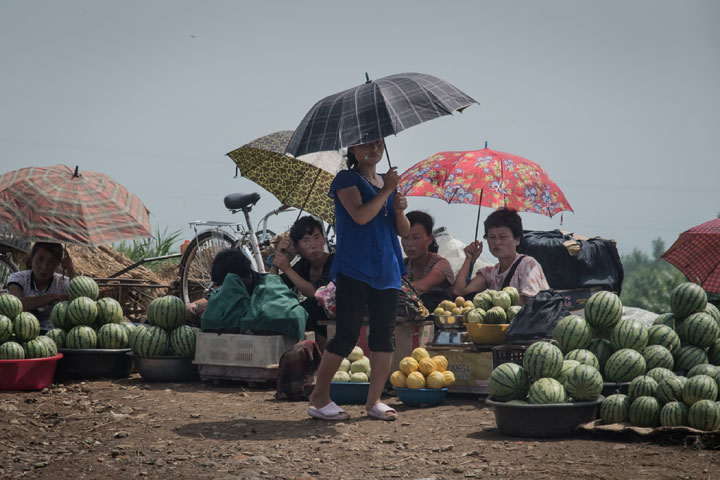U.S. President Donald Trump tweeted on Monday that his country has given “billions” of dollars to North Korea and is “getting nothing” for it.

Trump may have exaggerated somewhat – according to a 2014 report by the Congressional Research Service, the U.S. gave over $1.3 billion in aid to North Korea between 1995 and 2008 and very little since, although the country has been receiving international assistance off and on for years.
Canada provided $25 million in aid between 2005 and 2015, largely through the World Food Programme and other major international organizations, according to a fact sheet on the Global Affairs Canada website. Elliot Tepper, a senior research fellow at Carleton University’s Centre for Security, Intelligence and Defence Studies, says it’s hard to know just how much money North Korea gets from all international sources – particularly the biggest donor, China.
“We can monitor what comes from the West, from Japan, from South Korea, but what comes from China is almost invisible in terms of defining what is trade and what is aid,” he said.
But why are countries giving money to North Korea in the first place? In short, it’s to help the North Korean people – not the regime.
Most international assistance to North Korea is food aid. A terrible famine in the mid-1990s left somewhere between hundreds of thousands and three million people dead. (Estimates vary widely and can’t be verified.)
“It was a horrendous famine that took a significant portion of the population either into death or into stunted growth and malnutrition,” said Tepper.

Get breaking National news
During that famine, the North Korean regime accepted help from the World Food Programme and other international organizations.
Tepper believes that the North Korean government tends to become more belligerent as a roundabout way of getting aid. “They create a crisis and agree to back down in exchange for receiving a variety of types of assistance,” he said. Aid has definitely helped bring North Koreans to the negotiating table at least twice over the past few decades.
Although things have gotten somewhat better since the famine, there are still food shortages and UN agencies periodically issue calls for more donations to continue their humanitarian work. A drought this summer could mean yet another bout of hunger in the country, said Tepper.
To Tina Park, founder of the Canadian Centre for the Responsibility to Protect, a lot of North Korea’s economic problems are the government’s fault. “North Korea is very poor, from objective standards. But one-quarter of their GDP goes straight to the military,” she said.
The government has also failed to invest in infrastructure, she said, meaning that farmers are making do with obsolete technology and crops are vulnerable to extreme weather. “The natural disasters really affect their crop production.”
Wealth is also unevenly spread between the rural poor and an urban elite class. “There’s a fundamental disconnect I think when it comes to North Korea in terms of how the elites live,” she said. “Their luxury spending has actually gone up in the past few years which is really mind-boggling if you look at how poor the entire population is. And yet they’re building ski resorts and spending money on very luxurious goods.”
Tepper thinks that favouring elites is a deliberate policy choice by the North Korean government. “We are facing a situation now where the government for its own survival feels that it must invest almost its entire budget towards maintenance of the elite of the country at the cost of helping their own starving population.”
That means that the international community faces a choice, he said. “Do we work with the World Food Programme, with UNICEF, with other aid agencies that can directly reach people who are most vulnerable, or do we say no, this regime is too reprehensible and they could be providing for their own if they stopped diverting the money that is needed into weapons manufacture?”
South Korea, which recently announced a new $8-million aid package for its northern neighbour, seems to think that continued aid is worthwhile.
“The South Koreans have said over and over again, why should the people, people that they consider family, suffer because of the politics of the regime? And it’s a very good question,” said Tepper.
Park agrees.
“They didn’t choose to be that way. They’re kind of stuck under the dictatorship.”
Foreign aid isn’t just a blank cheque, she said, it’s tied to specific food or medical provisions. “Whenever there is an aid package from South Korea or the U.S. or elsewhere usually there are strings attached to ensure that it goes to the people.”
And although the government could be doing better to provide for its people, she doesn’t think that’s a reason to withhold aid.
The South Korean perspective, she said, is, “We don’t want another war, and we also don’t want the people of North Korea to die from starvation.”
“While we focus on a lot of nuclear and military developments in North Korea, the really serious problem is that people are dying from lack of food and lack of access to hospitals and health care.”










Comments
Want to discuss? Please read our Commenting Policy first.